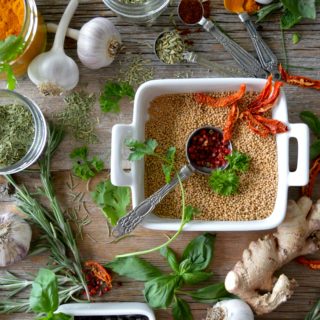Cholesterol: Tips to Lower Cholesterol Levels

What is cholesterol?
Cholesterol is a type of fat or fatty substance known as lipid that is part of all animal cells.
It is essential for many of the body’s metabolic processes, including the production of hormones, bile and vitamin D.
There are 2 main sources of the cholesterol in your blood:
- cholesterol in the food you eat
- cholesterol produced by your liver
Is Cholesterol important?
Cholesterol is produced by the liver and also made by most cells in the body. It is carried around in the blood by little ‘couriers’ called lipoproteins.
We need a small amount of blood cholesterol because the body uses it to:
- build the structure of cell membranes
- make hormones like oestrogen, testosterone and adrenal hormones
- help your metabolism work efficiently, for example, cholesterol is essential for your body to produce vitamin D
- produce bile acids, which help the body digest fat and absorb important nutrients.
How cholesterol moves around the body
Cholesterol is carried in your blood by proteins. When the two combine, they’re called lipoproteins. There are two main types of lipoprotein.
- High-density lipoprotein (HDL) carries cholesterol away from the cells and back to the liver. From there it’s either broken down or passed out of the body as a waste product. For this reason, HDL is referred to as “good cholesterol” and higher levels are better.
- Low-density lipoprotein (LDL) carries cholesterol to the cells that need it. If there’s too much cholesterol for the cells to use it can build up in the artery walls, leading to disease of the arteries. For this reason, LDL is known as “bad cholesterol”. It is called the ‘bad’ cholesterol because when its level in the bloodstream is high, it can lead to blockages that prevent blood flow to your heart.
The amount of cholesterol in the blood, both HDL and LDL, is measured with a blood test.
Did you know that high cholesterol has no symptoms? It’s so important to have a regular blood test to keep levels in check. If your cholesterol is too high, you can do something about it.
Simple dietary and lifestyle changes make a big impact on cholesterol and overall health.
Why should I test for cholesterol?
Evidence strongly indicates that high cholesterol can increase the risk of:
- narrowing of the arteries (atherosclerosis)
- heart attack
- stroke
- transient ischaemic attack (TIA) – often known as a “mini stroke”
- peripheral arterial disease (PAD)
This is because cholesterol can build up in the artery wall, restricting the blood flow to your heart, brain and the rest of your body. It also increases the risk of a blood clot developing somewhere in your body.
Your risk of developing coronary heart disease also rises as your blood’s cholesterol level increases. This can cause pain in your chest or arm during stress or physical activity (angina).
Risk factors for high cholesterol
There is no single cause of high cholesterol, but there are some controllable risk factors (smoking) and non-controllable risk factors (age).
Risk factors for high cholesterol include:
- age
- smoking
- lack of physical activity
- overweight or obesity
- family history
- unhealthy diet
Dietary Tips to Lower Cholesterol Levels
A major contributor to a high cholesterol level is a poor diet. Diet that is heavy on saturated fats and processed foods lead to weight gain, obesity, and high cholesterol levels.
Fortunately, changes in diet can make a big difference in your cholesterol numbers. Here are some of the best tips for lowering cholesterol with your food choices.
-
Minimize Saturated Fats
The biggest thing you can do to lower cholesterol is cut back on saturated fats. Dietary saturated fat increases LDL cholesterol.
Foods high in saturated fats include:
- Fatty cuts of beef, lamb, and pork
- Poultry with the skin
- Full or high-fat dairy products
- Fried foods and many baked goods
- Palm, palm kernel, and coconut oil
How to avoid saturated fats
To assist with lowering cholesterol levels, reducing foods high in saturated fats can help. Try to minimise intake of:
- fatty meats-eat lean meat and avoid poultry skin
- processed meats like salami and sausages
- snack foods like chips
- most takeaway foods, especially deep-fried foods
- cakes, biscuits and pastries.
-
Cut out Trans Fat
Trans fat are largely artificial fats, made when unsaturated vegetable oils are hydrogenated to give them a longer shelf life. Many food producers have cut out trans fats but look for it in the ingredient list as partially hydrogenated oil. You may see them in baked goods, vegetable shortening, microwave popcorn, frozen pizzas and doughs, margarine, and fried foods.
-
Replace Saturated and Trans Fats with Unsaturated Fat
Not all fats are bad, and in fact, you need fat in your diet. Replace the bad fats with poly and monounsaturated fats. This includes omega-3 fatty acids.
For polyunsaturated and omega-3 fats, eat more walnuts, chia seeds, ground flax seeds, and fatty fish like sardines, tuna, salmon, and mackerel. For monounsaturated fats, choose olive oil, canola oil, nuts, and avocados.
-
Eat More Soluble Fiber
Soluble fiber blocks the absorption of cholesterol in the digestive tract.
Good sources of soluble fiber include beans, peas, lentils, whole fruits and berries, and whole grains.
-
Try Plant Sterols and Stanols
These substances are found in plants and are similar in structure to cholesterol. You can find stanols and sterols in some vegetable oils, added to certain foods, and as supplements.
Other Lifestyle Changes to Lower Cholesterol
Dietary tips are essential for lowering cholesterol. You cannot outrun or out-exercise a bad diet. For the best results, combine a healthy diet with other lifestyle changes:
- Exercise. Being physically active reduces LDL and increases HDL levels. Aim to be exercise for at least 3 days per week, even if it is low-intensity exercise, like walking, cycling or jogging.
- Manage weight. Losing weight if you are overweight or obese can have a positive impact on cholesterol. It also reduces the risk of metabolic syndrome and diabetes, both of which are connected to high cholesterol.
- Stop smoking. Smoking is bad for health in so many ways. Cholesterol is just one of them. Smoking is associated with higher LDL and lower HDL levels. The damage it causes to cholesterol is reversible with quitting.
- Lower stress. Lower or manage stress in your life to improve cholesterol levels. Research shows that stress may raise LDL and lower HDL cholesterol.
Managing cholesterol is one of the best things you can do for your health
When you do annual medical examination (I highly recommend. Most medical covers provides the benefit) get tested for cholesterol.
Resource:
https://www.health.harvard.edu/heart-health/11-foods-that-lower-cholesterol



